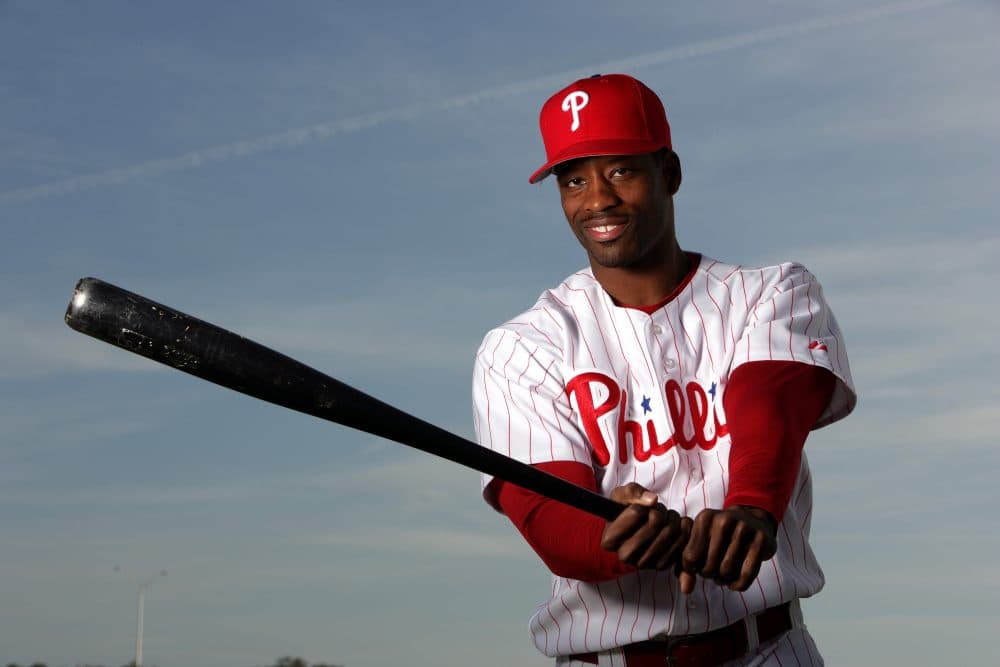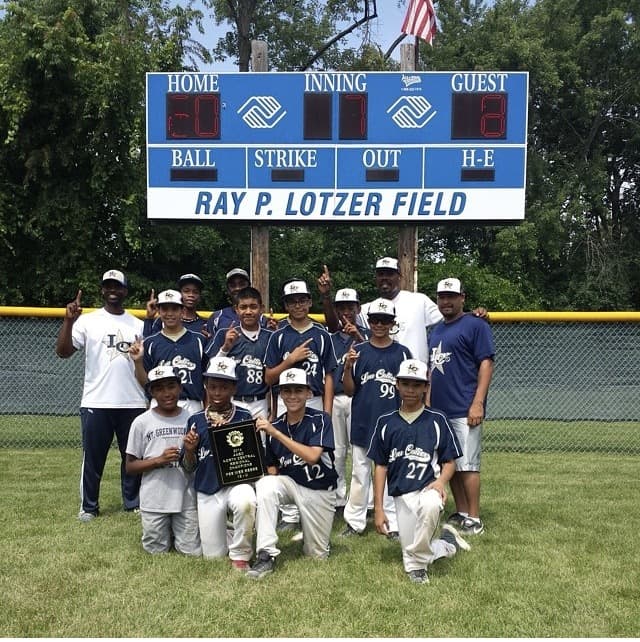Advertisement
On Chicago's South Side, Lou Collier Tries To Stage A Baseball Comeback

Lou Collier grew up on the South Side of Chicago during the '70s and '80s. He remembers wanting a better life.
Collier's mom was a social worker. His father was a Vietnam vet who worked for Sherwin-Williams. They lived in the Roseland neighborhood.
"You know, it was low-income housing," he says. "It was like a close-knit community. Nobody came in. Nobody came out."
Collier spent weekends watching Cubs games with his dad on TV. He looked up to African-American players, and sometimes his dad told him stories about Jackie Robinson.
"He just told me that it always looked like he was playing like it was his last day — that he might not ever get another chance to do it," Collier says. "So he left everything out on the field. And I just remember that. And that's how I played."
'Baseball Was King In My Neighborhood'
Back then, Collier says baseball was all over the South Side of Chicago:
"Baseball," he says, "was king in my neighborhood."
"As a kid, it was everything to me. It wasn't no pickup game. It was, like, 'Man, you better come wit it.'"
Lou Collier
Collier's side of the neighborhood fielded a team — they called themselves the White Sox. They'd play the kids from the other side -- the Royals.
"It was like the World Series," he says. "We played each other in a seven-game series. The neighborhood was only so big, but one team would have they home field in one area of the neighborhood. And the other team would have they home field in another area of the neighborhood. And the fields was makeshift fields. They wasn't — I'm telling you it wasn't 90 feet. It was just like, 'Hey, OK, we gon' put the bases here.'"
Collier says the fields were too narrow because they were wedged between houses.
"I remember guys hitting balls through apartment windows," he says. "But those games was intense. As a kid, it was everything to me. It wasn't no pickup game. It was, like, 'Man, you better come wit it.'"
By the time he was 8, Collier was playing with 13 year olds. He kept getting better. And he started seeing baseball as a way out.
Advertisement
Collier went on to play at a nearby junior college. Then the Pittsburgh Pirates picked him in the 31st round of the 1992 MLB Draft.
'It Must've Been 10 Times Tougher For Jackie Robinson'
Back then, Collier says there were 70 to 100 other African-American players in the Pirates’ organization.
It wasn’t always easy for them.
"The opposing fans would say anything to try to distract you — whether they meant it or not," he says. "I've heard the N-word. I heard that my mom stinks. That I'm a bum. And then I realized, like, 'Man, it must've been 10 times tougher for Jackie Robinson.'"
Collier says it all made him play harder. In '97 he got called up to Pittsburgh. Two years later he got picked up by the Milwaukee Brewers. They had a veteran African-American player — a guy named Marquis Grissom.
"Once I made the team," Collier says, "he was, like, 'Man, don't worry about finding nowhere to live. You gon' live with me.' I was, like, 'Man, are you serious?' He said, 'I got you. Don't worry about it.' And that was a blessing. That was a blessing. You know, he just taught me how to be a professional. That right there changed my life."
Grissom also taught Collier something about being a mentor — but we'll get to that later.
Collier spent eight years in the big leagues. Played for five different teams.
And by the early 2000s, he started noticing something.
Noticing A Decline
"In the whole organization, it’d be three or four African-Americans," he says. "And I'm, like, 'This can't be true.' I would talk to guys and I'd be, like, 'How many brothers in the organization with y'all?' They'd be, like, 'Five.' I'm, like, 'Five?!' What kinda — I couldn't understand that. You felt like something wasn't right. Because you know that the talent is there. So what's the difference now?"
There have been a lot of theories. Some say youth baseball has gotten too expensive. Some say scouts look for talent at fancy travel team tournaments – not in inner cities.
"I can't pinpoint what the exact reasons were," Collier says. "But I told myself, 'You know what: I’m gonna go back home and teach the game to kids in my community.' I'll do my part."
So after retiring, Collier went back to Chicago. He started going to little league games. A lot had changed.
Kids' fundamentals were worse — like they weren't playing as often. Collier's friends told him that ever since Michael Jordan came to town, basketball was king.
And then there was the violence.
"Chicago is a rough, rough city. It's tough," he says. "The education system is failing. The gangs are bad. The murder rate is up. There's a lot of obstacles that kids have to endure on a daily basis, just living."
'Baseball Is Back Happening In Chicago'
Collier decided to start a travel team. They would go to those expensive weekend tournaments where scouts would see them.
He started recruiting players from community centers and little league games. He found sponsors to offset fees.
That first year he fielded two teams. Since then, the Lou Collier Baseball Association has grown – and even lured in some basketball players.
Take Josh Williams. A couple years ago, when he was 12, Williams showed up at a basketball gym — and found Collier practicing baseball with his players. Williams poked his head in and asked:
"'Can I join the team?'" Collier recalls. "And then I looked at him, like, 'Man.' I said, 'Where have you played?' He said, 'I never played before.' I was, like, 'Wow.' But I looked at him, and he looked like he was serious. And he had a pretty athletic body. So we added him to the team. And I told our head coach. I said, 'We got a new player and he a basketball player.' And he just laughed, like, 'Man, what am I gon' do with a basketball player who never played?'"

At the start of the season, Williams struck out every at bat.
At the end of the year, the team went to a tournament and reached the championship. Williams hadn't played much — but the night before the game he said:
"'Coach, I'm ready. I need to be in there,'" Collier recalls. "And I seen in his eyes. I'm, like, 'Man, OK.' So the next day I told the head coach — I was like, 'Man, get him in the lineup. Just put him in there.' He looked at me like I was crazy. I was, like, 'For real. I'm serious. Bat him ninth.' And he was, like, 'Aight, man.' He put him in the lineup. Man, this kid went 3-for-4, two home runs and drove in, like, seven runs. We was so excited for him. And he was, like, 'I told you, Coach!'"
Now, Josh Williams is a high school sophomore. Collier says he has a good shot at landing a college scholarship. So far, dozens of kids from the Lou Collier Baseball Association have gone on to play college ball.
"That's what was on my heart when I came back — to try to change lives like that," he says.
The program now serves about 130 kids. Sometimes Collier tells them stories about Jackie Robinson. He says that they should never let negativity distract them from their dreams.
Lou Collier is optimistic that more African-Americans will reach the big leagues.
Just last year, Corey Ray from the South Side of Chicago was the fifth overall pick in the MLB Draft.
"Baseball is back happening in Chicago," Collier says. "Yeah, it's back happening."
Lou Collier, who grew up watching black players on television, hopes that someday soon, kids on the South Side of Chicago will turn on their TVs and see Corey Ray – and they’ll believe, just as Collier did, that they can make better lives for themselves.
This segment aired on April 15, 2017.
